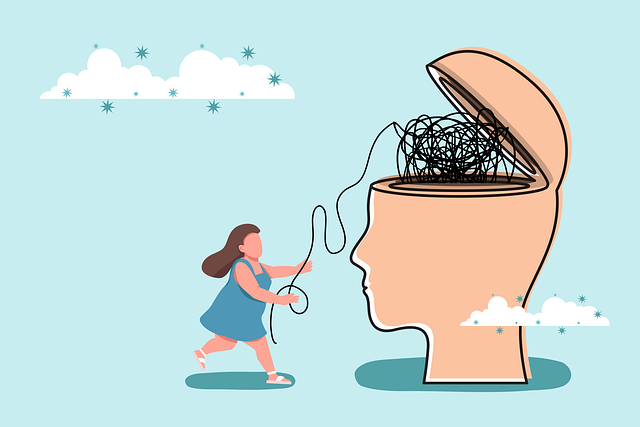Lakewood Therapy for Therapists-Clinicians offers a holistic, supportive framework that integrates mental, emotional, and physical health. Through programs like Mental Wellness Coaching, Emotional Intelligence training, and Mind Over Matter principles, therapists equip individuals with coping mechanisms and resilience-building techniques to manage stress and trauma. Workshops and ongoing education empower professionals to provide effective crisis intervention and innovative practices, leading to improved patient outcomes. Lakewood's holistic approach includes mindfulness practices, burnout prevention for therapists, and comprehensive tools for stress management, fostering growth and healing in both professionals and clients.
Mental wellness promotion is a holistic approach that empowers individuals to cultivate resilient minds and thrive. In today’s fast-paced world, understanding and prioritizing mental health is more critical than ever. This article explores key aspects of mental wellness promotion, including the foundational role of therapists-clinicians in fostering resilience, effective advocacy strategies, and innovative approaches like Lakewood Therapy. Discover how integrating holistic well-being practices can revolutionize therapeutic outcomes for clients.
- Understanding Mental Wellness Promotion: A Foundation for Therapeutic Practices
- The Role of Therapists-Clinicians in Fostering Resilient Minds
- Effective Strategies for Mental Health Advocacy and Education
- Lakewood Therapy: A Case Study on Integrating Holistic Well-being Approaches
Understanding Mental Wellness Promotion: A Foundation for Therapeutic Practices

Mental wellness promotion serves as a foundational framework for therapists and clinicians engaging in therapeutic practices. It involves a holistic approach that recognizes the interconnectedness of mental, emotional, and physical well-being. By understanding the nuances of individual experiences and fostering an environment of support and empathy, Lakewood Therapy for Therapists-Clinicians can effectively navigate complex therapeutic landscapes.
This proactive strategy delves into various aspects such as Mental Wellness Coaching Programs Development, which equips individuals with coping mechanisms to manage stress and enhance resilience. Emotional Intelligence plays a pivotal role in cultivating self-awareness, while Emotional Healing Processes help clients work through traumatic experiences. Through these integrated approaches, therapists can enable clients to achieve lasting improvements in their mental wellness, ultimately enhancing their overall quality of life.
The Role of Therapists-Clinicians in Fostering Resilient Minds

Therapists-clinicians play a pivotal role in fostering resilient minds by employing effective empathy building strategies and integrating Mind Over Matter principles into their practice. Empathy, the ability to understand and share the feelings of another, is a cornerstone of therapeutic relationships, enabling professionals to build trust and connect deeply with clients. Through active listening, open communication, and genuine concern, therapists create safe spaces where individuals feel heard and validated, fostering a sense of comfort and openness necessary for healing.
Incorporating Mind Over Matter principles, which focus on empowering individuals to take control of their mental well-being, allows therapists to guide clients towards self-discovery and personal growth. By teaching coping mechanisms, resilience-building techniques, and mental health education programs designed to challenge negative thought patterns, therapists equip individuals with the tools needed to navigate life’s challenges effectively. This holistic approach not only supports clients in managing existing conditions but also equips them with long-term strategies for maintaining overall mental wellness, ultimately fostering resilient minds capable of thriving in various aspects of life.
Effective Strategies for Mental Health Advocacy and Education

Mental health advocacy and education are vital components in fostering a culture that prioritizes emotional well-being. For therapists and clinicians, such efforts can significantly impact their communities, especially when tailored to suit local needs. One effective strategy is to offer Lakewood Therapy for Therapists-Clinicians workshops or training sessions, providing ongoing learning opportunities on innovative practices and the latest research in mental health care. These platforms enable professionals to enhance their skills in areas like Coping Skills Development and Crisis Intervention Guidance, thereby improving patient outcomes.
Additionally, developing Mental Wellness Coaching Programs can empower individuals to take charge of their mental health. Such programs, when designed by experienced therapists, can be delivered through various channels, making quality mental wellness resources accessible to a broader audience. By combining advocacy, education, and practical tools like these, communities can create a supportive environment where people feel equipped to navigate life’s challenges and maintain optimal mental wellness.
Lakewood Therapy: A Case Study on Integrating Holistic Well-being Approaches

Lakewood Therapy stands out as a case study exemplifying the integration of holistic well-being approaches in mental health promotion. This therapeutic space offers more than traditional talk therapy, focusing on nurturing both the mind and body. By incorporating practices like mindfulness, yoga, and meditation into their sessions, Lakewood Therapy addresses the root causes of distress, providing clients with comprehensive tools for managing stress and improving overall mental wellness.
The approach extends to burnout prevention strategies specifically tailored for healthcare providers and clinicians. Recognizing that therapists themselves require support to avoid burnout, Lakewood offers trauma support services aimed at fostering empathy and resilience. Through these initiatives, therapists are equipped not only to assist their clients but also to maintain their own emotional well-being, creating a sustainable environment for both professional growth and client healing.
Mental wellness promotion is a holistic approach that involves understanding, advocating, and integrating diverse strategies. As seen in the case study of Lakewood Therapy, combining therapeutic practices with holistic well-being methods can significantly enhance mental health outcomes. Therapists-clinicians play a pivotal role in fostering resilient minds by adopting effective advocacy and education techniques. By upholding these principles, professionals in the field can contribute to a more comprehensive and supportive environment for those seeking mental wellness.














